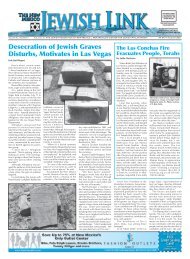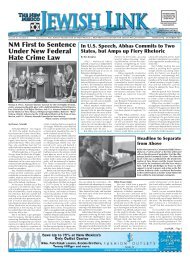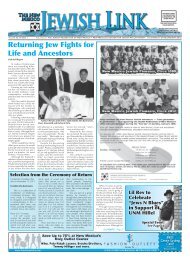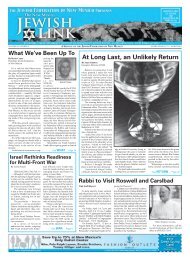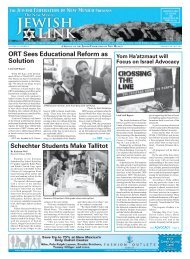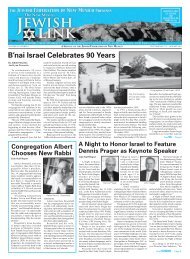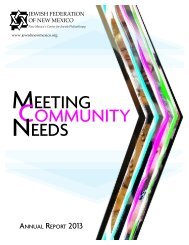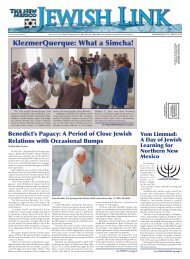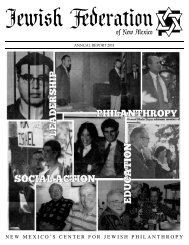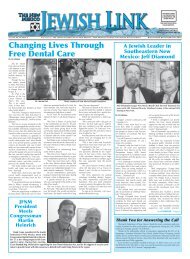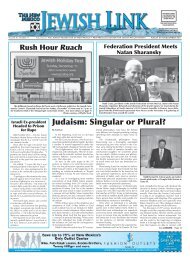September 2011 - Jewish Federation of New Mexico
September 2011 - Jewish Federation of New Mexico
September 2011 - Jewish Federation of New Mexico
Create successful ePaper yourself
Turn your PDF publications into a flip-book with our unique Google optimized e-Paper software.
<strong>September</strong> <strong>2011</strong> A Service <strong>of</strong> the <strong>Jewish</strong> <strong>Federation</strong> <strong>of</strong> <strong>New</strong> <strong>Mexico</strong> The <strong>New</strong> <strong>Mexico</strong> <strong>Jewish</strong> Link 3<br />
Matisyahu Looks to Bridge the <strong>Jewish</strong> Gap<br />
By Sam Sokolove<br />
If you publish a <strong>Jewish</strong> newspaper<br />
and someone asks you to interview<br />
their friend’s son because he’s<br />
doing work that may be “interesting”<br />
to <strong>Jewish</strong> readers, responding with a<br />
noncommittal nod may be the wise<br />
move.<br />
Regardless, thanks to the efforts<br />
<strong>of</strong> Link advertising manager, Anne<br />
Grollman, last month I spent a few<br />
minutes chatting with the young man<br />
Anne knows as Matthew Paul Miller,<br />
a friend’s son who over the last few<br />
years has transformed himself into<br />
Matisyahu, the Hassidic reggae singer<br />
and cultural phenomenon known to<br />
millions for his tireless touring and<br />
electrifying appearances on Late<br />
Night with David Letterman and<br />
Jimmy Kimmel Live.<br />
Since 2004, Matisyahu has<br />
released three studio albums, two<br />
live albums, two remix CDs and two<br />
DVDs <strong>of</strong> live concerts. Named by the<br />
Forward as one <strong>of</strong> the 50 most influential<br />
Jews in the world for “a following<br />
that stretches all the way from Crown<br />
Heights to the pages <strong>of</strong> the ‘beer and<br />
babes’ magazine FHM,” the peyos<br />
By Janet Yagoda Shagam<br />
The faces were familiar. Among<br />
them, I could see a cousin’s nose,<br />
my daughter’s pr<strong>of</strong>ile, an old<br />
friend’s smile and even the rainbow<br />
hat my son wore as a young child.<br />
All <strong>of</strong> these faces – and the hat too,<br />
belong to Russian Jews now living<br />
in Germany.<br />
A Sunday afternoon garden<br />
party at Congregation Bet Shalom,<br />
located in Göttingen, Germany provides<br />
a snapshot <strong>of</strong> the challenges<br />
<strong>of</strong> maintaining a <strong>Jewish</strong> identity in<br />
this small city. Göttingen is home to<br />
Georg-August University. Founded<br />
in 1737, the university boasts <strong>of</strong><br />
having an association with over 45<br />
Nobel Prize winners.<br />
In the 1930s, the university became<br />
the focal point for what the<br />
Nazis called “<strong>Jewish</strong> physics.” As a<br />
result, many <strong>Jewish</strong> scientists such<br />
as Leo Szilard, Edward Teller and<br />
Max Born fled Göttingen for the<br />
United States and other nations.<br />
Those who did not leave in time<br />
were killed.<br />
Today, Göttingen’s small <strong>Jewish</strong><br />
community is helping recent<br />
Russian <strong>Jewish</strong> immigrants adapt to<br />
life in Germany and rekindle <strong>Jewish</strong><br />
traditions. Till Baeckmann, the congregation’s<br />
vice-president, says that<br />
it is <strong>of</strong>ten the little things such as<br />
enjoying Shabbos c<strong>of</strong>fee and cake<br />
together, that make the biggest difference<br />
for these congregants.<br />
The Sunday afternoon garden<br />
party is a well-attended gathering.<br />
It is a time to share food, memories<br />
and sing Yiddish and Hebrew<br />
songs. As a way <strong>of</strong> breaking into this<br />
cohesive group, I announced that<br />
and kippahdonning<br />
singer<br />
has<br />
seen his<br />
pr<strong>of</strong>ile<br />
rise from<br />
curiosity<br />
to a Matisyahu<br />
musician<br />
who has earned the respect <strong>of</strong><br />
rappers like Shyne, Waleed Shabazz<br />
and legendary record producers Bill<br />
Laswell and Sly and Robbie.<br />
My seven-year-old daughter,<br />
however, knows Matisyahu as the<br />
cool guy who beat-boxed “Hava<br />
Nagilah” to Oscar the Grouch’s<br />
Israeli doppelganger, Moishe O<strong>of</strong>nik,<br />
on Shalom Sesame.<br />
Speaking a week before Matisyahu<br />
was scheduled to headline<br />
the Taos Mountain Music Festival,<br />
I asked the s<strong>of</strong>t-spoken, 32-year-old<br />
father <strong>of</strong> three from White Plains,<br />
N.Y. if being labeled a <strong>Jewish</strong> icon<br />
at such a young stage <strong>of</strong> his career<br />
was difficult to handle.<br />
“I guess I don’t think about it in<br />
terms <strong>of</strong> a burden, really,” he demurs.<br />
“It’s a bit <strong>of</strong> an opportunity.”<br />
Asked if he foresees his lyrics,<br />
which are rooted in Torah-true<br />
themes like injustice, self-determination<br />
and spiritual liberation, getting<br />
into more specific areas such as the<br />
Israeli-Palestine conflict and anti-<br />
Semitism, he doesn’t see that happening.<br />
“I’m politicized in the sense<br />
that’s who I am, and if anyone did the<br />
work to check out my beliefs, they<br />
would probably figure it out.”<br />
“It’s not my purpose,” he continues.<br />
“I have a way <strong>of</strong> doing what<br />
I’m doing, and it’s not by attacking<br />
politics head-on. It would be ridiculous<br />
for me to do something like that.<br />
What I’m doing is so much bigger<br />
and more important than that, influencing<br />
or affecting people’s feelings<br />
about Jews and Israel in a way that<br />
actually works.”<br />
He’s less interested in carrying<br />
the banners <strong>of</strong> others or the workings<br />
<strong>of</strong> communal politics than following<br />
his unique charge; he admittedly<br />
has no interest in the contemporary<br />
<strong>Jewish</strong> music scene populated<br />
by performers like Craig Taubman<br />
and Rick Recht, and had nothing to<br />
say regarding the heavily publicized<br />
my father was from Zambrov. A few<br />
women looked up from their dinner<br />
plates and said, “Ah, Polski.” Then<br />
in unison, they continued, “Essen.”<br />
Conversation was difficult, but<br />
nonetheless, there was a wonderful<br />
homey feel to the afternoon.<br />
The Russian Jews aren’t the only<br />
new arrivals in Göttingen. Similar to<br />
the community that prays within its<br />
walls, the synagogue is also a new<br />
émigré. Built in 1825, the synagogue<br />
was located in the nearby<br />
village <strong>of</strong> Bodenfelder. However, in<br />
1937, in an effort to hide the synagogue<br />
from the Nazis, the building<br />
became a barn.<br />
The synagogue located in Göttingen<br />
itself was destroyed during<br />
Kristallnacht on November 8, 1938,<br />
along with so many others.<br />
More than 10 years ago, the Göttingen<br />
<strong>Jewish</strong> community decided<br />
to build a new synagogue to replace<br />
the one the Nazis destroyed. Their<br />
goal was to consecrate the new<br />
building on the 70th anniversary<br />
<strong>of</strong> the Night <strong>of</strong> Broken Glass. After<br />
some discussion, they decided that<br />
giving a new life to the Bodenfelder<br />
barn was a more meaningful solution.<br />
The Synagogue Project began<br />
in 1998. Under the leadership <strong>of</strong><br />
Jacqueline Jürgenliemk, a local psychotherapist,<br />
the group raised funds<br />
to bring the small cross-timbered<br />
building to Göttingen. The farmer<br />
willingly sold the barn for a symbolic<br />
fee <strong>of</strong> a few Euros.<br />
However, dismantling, moving<br />
and reassembling the synagogue<br />
in downtown Göttingen cost more<br />
than 500,000 Euros. To fund the<br />
project, the group received reparation<br />
monies from the German<br />
government as well as donations<br />
from private contributors and the<br />
Evangelical Lutheran and Catholic<br />
churches.<br />
Today, Bet Shalom stands in an<br />
older neighborhood near the center<br />
<strong>of</strong> town. Baeckmann proudly states<br />
the synagogue has a membership<br />
<strong>of</strong> more than 170 families, an itinerant<br />
rabbi, weekly congregationrun<br />
services and an active Chevra<br />
Kadisha.<br />
However, as the majority <strong>of</strong><br />
members are elderly Russians, he<br />
is worried about the congregation’s<br />
future. While Baeckmann hopes the<br />
establishment <strong>of</strong> a religious school<br />
will attract younger families, he bemoans<br />
that the lack <strong>of</strong> a local source<br />
demise <strong>of</strong> his first label, the <strong>Jewish</strong><br />
media start-up J-Dub. Rather, his<br />
interests are focused on a scene that<br />
he largely created single-handedly.<br />
For some academics, Matisyahu<br />
has come to personify the comfort<br />
and openness young American Jews<br />
feel in expressing their <strong>Jewish</strong>ness in<br />
all sectors <strong>of</strong> their life, something that<br />
would have been unimaginable even<br />
two decades ago.<br />
Asked whether he thought <strong>Jewish</strong><br />
denominations actually mattered in<br />
the open and fluid world <strong>of</strong> American<br />
Jewry, he responds, “There’s a<br />
pretty big difference between Reform<br />
and Orthodox Judaism philosophically,<br />
so there I would say yes. In the<br />
old days, within Orthodoxy you were<br />
either one or the other, a Maggid<br />
or a Hassid, and they were pretty<br />
opposed to each other. I don’t think<br />
that really exists so much today, (that)<br />
the denominations within Orthodoxy<br />
are as clear cut. I think there’s more<br />
a scope <strong>of</strong> influence.”<br />
“I personally don’t feel it’s really<br />
necessary,” he elaborates. “I’m<br />
not opposed to it either, if it makes<br />
people really identify strongly with<br />
one group, I don’t see why that’s a<br />
Lost and Found: A Trip to Gottingen<br />
Singing Yiddish and Hebrew songs at a summer garden party for members<br />
<strong>of</strong> Bet Shalom in Gottingen, Germany. Photo courtesy <strong>of</strong> Janet Yagoda<br />
Shagam.<br />
<strong>of</strong> kosher meat makes him and other<br />
congregants de facto vegetarians.<br />
For me, the Bet Shalom synagogue<br />
takes on considerable personal<br />
meaning. For the past eight<br />
years, I have taught a writing workshop<br />
at the Max Planck Institute,<br />
which shares a close association<br />
with Georg-August University. I appreciate<br />
my affiliation with these<br />
prestigious institutions and enjoy<br />
working with their enthusiastic students.<br />
However, I have <strong>of</strong>ten wondered,<br />
“Why me and why here?”<br />
Now, knowing that people who<br />
could be part <strong>of</strong> my family have<br />
found a safe and welcoming home<br />
in this city gives a deeper context to<br />
my journey.<br />
problem. But I did notice a tendency<br />
in general -- not just in Judaism, but in<br />
life -- to identify solely with one thing,<br />
to box yourself into one specific way<br />
a life. For me personally, I don’t see<br />
that as a good thing.”<br />
As for the impression that his<br />
music was being welcomed by<br />
Jews across the spectrum <strong>of</strong> observance<br />
and identification, Matisyahu<br />
expresses his belief that, “The gap is<br />
becoming closer.”<br />
“Especially in Israel, there are a<br />
lot <strong>of</strong> artists, performers that were<br />
very secular that recently became<br />
ba’al teshuvah he says, citing Israeli<br />
orthodox Jazz saxophonist Daniel<br />
Zamir as an example. “There are<br />
a lot <strong>of</strong> people out there who are<br />
showing that the gap is not so<br />
drastic, that you can be religious<br />
and an artist or musician and show<br />
how religion and art in general are<br />
not at odds with each other. You are<br />
starting to see a lot more acceptance<br />
from the secular community towards<br />
religion.”<br />
Matisyahu concedes that he has<br />
played a role in this shift. “But I don’t<br />
need to hear it,” he insists. “That’s<br />
what I am. That’s who I am.”<br />
Creative<br />
Chuppahs<br />
B y R o z<br />
Your Wedding Day<br />
deserves a chuppah<br />
that is uniquely yours<br />
Custom handcrafted to<br />
your specifications<br />
Prompt, personal,<br />
and expert service<br />
Reasonable Prices<br />
Rosalyn Cohen<br />
505-892-2911<br />
413-441-1798<br />
mroboe@hotmail.com<br />
Leshanah tovah tikatev ve’ teichatem<br />
Licensed<br />
Bonded<br />
Insured<br />
KEN NELSON<br />
Lic.# 368313<br />
Office: 505.888.2495<br />
Fax: 505.888.1565<br />
NELCOconstruction@gmail.com<br />
Home Repairs & Maintenance<br />
Evaporative Coolers - Open/Close<br />
Laminate Wood & Tile Flooring<br />
Remodeling & Paint<br />
Doors & Windows<br />
Handyman<br />
For All Your Residential Needs!



